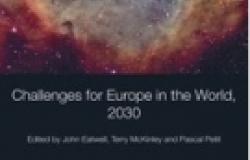Book Review: Challenges for Europe in the World

Challenges for Europe in the World, 2030 edited by John Eatwell, Terry McKinley and Pascal Petit. Farnham: Ashgate, 2014. 408 pp, £25 paperback 9781472419262, £72 hardcover 9781472419255, £25 e-book 9781472419279
Since the onset of the financial crisis in 2008-09 speculation about the future development of the global economy has been as rife as concerns about the future direction of the European Union. This book, edited by Eatwell, McKinley and Petit, takes up these deliberations in a broader context by considering Europe as a regional actor in a shifting international relations environment. The very comprehensive analysis presented in this edited collection is based on research that was conducted by the interdisciplinary AUGUR project under the EU 7th Framework programme.
The volume frames the analysis of Europe's future development in four global governance scenarios, which are outlined in greater detail in the final Chapter 9 by Gamble, Brett and Tomkiewicz. These are presented as: a) reduced government under deepening austerity conditions in the West, b) US-China accommodation, with both countries retaining the scope for governance influence on global developments, c) regionalisation in the form of deepening policy coordination on the regional level and d) multipolar collaboration through interlinkages between regional blocks. All these scenarios have their roots in the general assumption that global governance will to a greater or lesser extent have to follow the path of further liberalisation. Linked with this is an underlying scepticism about the future role of Europe as a region, and more specifically the EU as its institutionalised organisation, to be able to maintain its global influence.
For Europe specifically the authors in essence forecast the possibility of four different future development scenarios which are profoundly shaped by the fallout from the global financial crisis and the subsequent eurozone sovereign debt crisis. Under the first scenario (‘struggling on’), the EU would prove incapable to implement effective policy measures to counter the crisis effects. As a result, trust in the problem-solving capacity of mainstream politics would deteriorate further with the realistic potential of the growing alienation of citizens from the political process. The second scenario considers the possibility of the breakup of the eurozone and ultimately of the whole of the EU, which would result in the refocusing on national politics and the emergence of increasingly nationalist perspectives in the member states. Under the third scenario the authors anticipate the EU developing a consensus to deepen the integration process in response to the growing set of regional and global challenges. This ‘Federal Europe’ scenario sees the EU moving towards significantly deeper political integration with a 'massive transfer of political authority away from the nation state' (p. 322). The authors consider this only to be possible if the EU's institutions are substantially reformed towards greater democratic transparency, which ultimately would instil greater public confidence to support deeper political integration on the supranational regional level. Gamble, Brett and Tomkiewicz consider the democratic reform of European governance to be indispensible for the EU to gain greater legitimacy. To gradually establish a European spirit in the public mind consequently remains a fundamental challenge for the political elites in Europe.
The authors put forward suggestions on how this could be achieved. Most crucially they suggest that political elites need to engage in a sustained dialogue with the electorate with the overall purpose of promoting a European identity. This identity can be based on different foundations, but as the authors rightly point out one important element of public support for the EU is its 'instrumental appeal', which boils down to concrete improvements to the daily lives of individuals, mostly reflected by the freedoms which are provided by the Single European Market. The civic and cultural appeal of an integrated Europe, on the other hand, is less tangible in the public mind and usually closely interconnected with respective national identities. Promoting the EU as the safeguard of democratic liberty and shared common identity is hence more difficult and risks being undermined by eurosceptic and nationalist sentiments. Moreover, even the EU's instrumental appeal is under threat as a result of the economic consequences of the global financial crisis. Combined with the lack of reform of the EU's political institutions, Europe's economic weakness substantially undermines the public appeal of the European integration process.
The authors also consider the option of a multi-speed Europe developing, which would most likely consist of different integration speeds between the eurozone core and the outside periphery. Given the diversity of political interests in the EU-28, realistically the multi-speed option is more likely to occur in practice than the universal federalisation of the EU, which is unlikely to be supported by countries with more widespread public euroscepticism such as in the United Kingdom, the Czech Republic and Sweden. The fourth scenario substantially expands the integrative tendency of the Federal Europe concept. The 'multipolar' scenario, which resembles Mitrany's functionalist concept of spillover of powers towards a pattern of global institutions, considers the possibility that a substantial shift from the national and regional level of integration towards global cooperation and consequently international institutions may occur. This would most likely be the result of the inability to tackle mounting global challenges on the basis of national and regional policy mechanisms.
The edited volume offers comprehensive analyses in the form of individual expert chapters on the various major policy challenges facing Europe within the next fifteen years. These cover financial regulation, technological change, trade, environmental sustainability, energy, demographic development, migration and the issues affecting individual wellbeing such as social cohesion, education and health. In the executive summary in chapter 1 the editors emphasise that, since the onset of the financial crisis, national and European politics have been trapped in a state of 'muddling through'. This essentially boils down to patchy policy initiatives which lack strategic direction and fall short of a comprehensive approach towards resolving the major underlying challenges.
The contributions in the book reflect profound expertise on the mechanisms of European governance and the specific policy challenges facing the European continent in the global context. The main contribution of this volume lies in the multiple future scenario analysis, which offers political elites in Europe crucial insights into the potential future development of economic and political integration. Here this book goes much further than most existing publications, which tend to be limited to the analysis of the post-crisis EU policy mechanisms and current short-term policy challenges. This a bold approach given that the future path of the European continent and the EU as its representative organisation has become more uncertain than ever.
Dr. Christian Schweiger is Senior Lecturer in the School of Government and International Affairs at Durham University.


